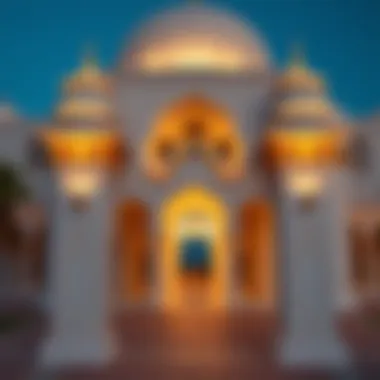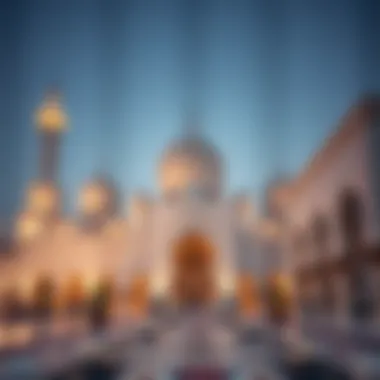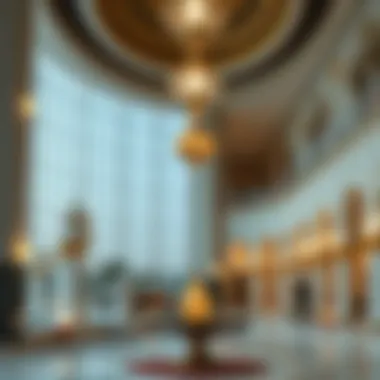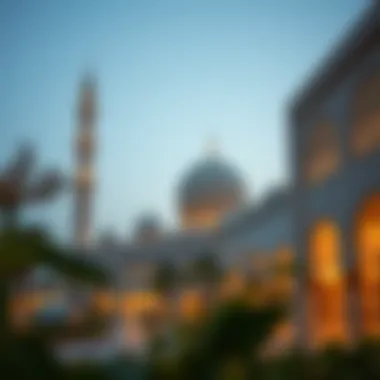Discovering Ramadan 2024 in the UAE: Timing and Traditions


Intro
As the moon crescent appears in the sky, marking the beginning of Ramadan, anticipation fills the air in the United Arab Emirates. The first Ramadan of 2024 is set to unfold in a region where tradition meets modernity, impacting not only cultural practices but also the dynamics of the real estate market. Understanding this month goes beyond mere observance; it encapsulates a rhythm that affects the lifestyle, business dealings, and even housing considerations for residents and expatriates alike. This article will explore the timing, cultural significance, and unique local traditions associated with Ramadan in the UAE, while also examining how this month influences real estate trends and investment opportunities in the bustling city of Dubai.
Market Trends
Current Market Overview
The real estate market in the UAE presents a complex tapestry, particularly during Ramadan. Many consider this month a time of reflection and spiritual renewal, but it also paves the way for distinct market characteristics. With families gathering and expatriates embracing local traditions, the demand for certain types of properties shifts in favor of larger residences that can accommodate more guests.
Moreover, areas like Dubai Marina or Downtown Dubai witness a surge in short-term rentals as tourists and family visitors flock in to partake in the month’s festivities. Given the influx of visitors intrigued by local culture, many property owners leverage this opportunity to optimize their rental income.
Future Predictions and Insights
Looking ahead, market experts suggest that the changes ushered in by Ramadan's unique atmosphere will ripple into summer months. The combination of cultural reverence and economic opportunity often aligns the timeline for new developments. Developers may consider launching projects aimed at families and expatriates, focusing on community-centric designs. Given Dubai's ever-evolving landscape, neighborhoods that provide accessible amenities and celebrate cultural traditions could see a boost in investment.
Some analysts predict a notable increase in interest towards properties that integrate traditional Islamic architecture with modern aesthetics. As the allure of living in a space that resonates with one's spiritual and cultural values grows, so does the potential for investment return.
Investment Opportunities
Emerging Neighborhoods
As the real estate landscape adapts to the shifting dynamics of Ramadan, certain neighborhoods are emerging as hot spots for investment. Areas like Al Furjan and Dubai South, which offer a blend of affordable housing options and family-friendly facilities, are becoming increasingly attractive. Their accessibility to educational institutions, healthcare services, and recreational activities make them ideal for families looking to settle down.
Additionally, neighborhoods that prioritize communal spaces for Ramadan activities – such as prayer areas, marketplaces, and parks – are likely to gain favor. This alignment with the cultural significance of the month could accelerate property appreciation.
Financing Options and Incentives
With the demand for family-sized homes particularly rising during Ramadan, potential buyers may look for financing options tailored to their needs. Local banks and financial institutions are expected to roll out specialized financing packages, perhaps with more favorable interest rates or lenient approval processes during this season.
Moreover, the UAE government's initiatives to boost home ownership among expatriates, such as long-term visas and other allowances, might find greater traction during this time of increased market activity. Being aware of these options can help buyers and investors make informed decisions.
Understanding Ramadan's Calendar Dynamics
Ramadan is not just a month on the calendar; it carries with it a profound significance that resonates deeply within the Muslim community. Understanding the intricacies of Ramadan's timing and its connection to the lunar calendar forms the backbone of this article. Not only does this knowledge enhance cultural appreciation, but it also serves as a practical guide for expatriates and real estate investors who navigate life in the UAE during this pivotal period.
The Islamic Lunar Calendar
The Islamic lunar calendar is distinct from the Gregorian calendar widely used in the Western world. Comprised of twelve months based on the moon's phases, it’s about 10 to 12 days shorter than the solar calendar, totalizing 354 or 355 days in a year. This characteristic leads to Ramadan shifting approximately five days earlier each year when viewed from a Gregorian perspective.
This shift has implications beyond just personal or communal observance; it affects daily routines, social interactions, and economic activities throughout the year. Understanding this calendar helps expatriates and local residents alike to prepare accordingly, as it significantly influences everything from work hours to social gatherings and dining customs.
Determining the Start of Ramadan


Determining the start date of Ramadan is a complex task. It involves observing the moon, specifically the crescent moon that marks the beginning of the ninth month in the Islamic calendar. In many cultures, local mosques or Islamic authorities announce Ramadan’s start based on moon sighting. However, with advancements in astronomy, several organizations now use astronomical calculations as a guide.
For 2024, Ramadan is anticipated to begin around the evening of Sunday, March 10, but the actual date may vary based on moon visibility. This unpredictability can lead to different communities starting Ramadan on different days, reflecting the cultural and theological diversity within the Muslim world.
Predicting Dates: Astronomical vs. Traditional Methods
The dual methods of predicting the start of Ramadan—astronomical calculations and traditional moon sighting—spark interesting debates among scholars and practitioners alike.
- Astronomical Methods: These techniques leverage modern scientific knowledge to predict the crescent moon's emergence, providing a reliable timeframe for when Ramadan is likely to commence. This approach can help communities plan better for economic activities surrounding the month, particularly in retail and leisure sectors.
- Traditional Methods: These are rooted in historical practices, where community members gather in anticipation and make efforts to physically sight the moon. While this method emphasizes cultural heritage, some argue it's less reliable compared to the precision of astronomy.
In essence, appreciating the dynamics at play in determining Ramadan’s start equips individuals—be they expatriates, investors, or locals—with necessary insights, allowing for more informed decision-making during this culturally rich period.
Ramadan in the UAE: A Holistic Overview
Ramadan is more than just a month of fasting; it embodies a unique cultural fabric woven together by spiritual significance, community engagement, and economic fluctuations. In the UAE, where traditions and modernity coexist harmoniously, this holy month takes on an amplified role in society. It’s a time for introspection, compassion, and renewed connections, all set against the backdrop of a diverse population including both locals and expatriates.
Cultural Relevance of Ramadan
During Ramadan, cultural practices are intertwined with religious observances, creating a profound sense of identity. Families gather for Iftar, breaking their fast together often punctuated by the smells of traditional dishes like Harees or Majboos. The atmosphere buzzes with a communal spirit as neighborhoods come alive, illuminated by lanterns and the sounds of evening prayers wafting through the streets. For expatriates, engaging in or observing these celebrations opens doors to understanding the rich Emirati culture, fostering inclusive connections and mutual respect. Festivals, community gatherings, and charitable initiatives flourish during this period, allowing everyone to partake in the essence of giving and reflection.
Ramadan's Impact on Daily Life
Life during Ramadan in the UAE shifts gear. Working hours become more flexible—companies often adjust schedules to accommodate fasting hours, allowing employees to finish early. Public spaces transform; restaurants and cafes might close during the day, while iftar tents pop up around the city, offering meals for those breaking their fast. For locals and expats alike, daily routines are modified; some may choose to take shorter periods at work or use the time for additional prayers and community services.
Moreover, the impacts are not just personal but also societal. Traffic patterns shift as people rush home for iftar, and public transport routes may adapt to this new rhythm. The evenings see a spike in social activities, with markets bustling as people engage in shopping and cultural activities post-sunset.
Economic Effects During Ramadan
The economic landscape during Ramadan presents unique dynamics. Retailers, both big and small, prepare for a surge in sales, particularly in grocery stores, clothing outlets, and restaurants. Special Ramadan promotions and packages are not uncommon, enticing consumers to indulge while respecting traditional practices. Furthermore, the hospitality sector often witnesses an uptick in demand, with many expatriates and tourists keen to experience the festive atmosphere.
Yet, there are nuanced shifts within the real estate landscape as well. The demand for short-term rentals may rise, given that many people prefer to host Iftar gatherings in larger spaces rather than at their own homes. Investors keen on property may notice the increasing popularity of residential units that cater to such communal living styles, presenting opportunities for those looking to tap into the cultural fabric of the region.
All in all, Ramadan in the UAE is not just a month of restraint; it symbolizes a time of generosity, community spirit, and cultural synergy that profoundly shapes the fabric of society during this significant period.
First Ramadan 2024: Specifics for the UAE
When observing Ramadan in 2024, it is essential to understand its unique implications within the United Arab Emirates. This month is not only a spiritual journey for Muslims but also a period deeply woven into the cultural fabric of the nation. The significance of this Ramadan occurs at the nexus of faith and daily life, as customs flourish and societal rhythms shift.
Timing Considerations
The timing of Ramadan is pivotal as it determines the transition in day-to-day life for many in the UAE. In 2024, Ramadan is anticipated to start on the evening of March 10, following the Islamic lunar calendar. Observers take note that the lunar months could shift slightly, depending on the sighting of the moon, influencing local timing. Residents need to adapt their schedules—work hours often adjust, with many businesses choosing to open later.
"The arrival of Ramadan changes not just the clocks, but also the hearts of those who observe it."
Moreover, understanding the Suhoor and Iftar timetables becomes essential. Suhoor, the pre-dawn meal, requires careful timing, while Iftar heralds the breaking of fast at sunset—a moment when families congregate. Coordination with local mosques is commonplace as communities gather to break bread together. Knowing these nuances helps in planning for families, expatriates, and even businesses navigating the altered schedules.


Key Dates and Events
The month of Ramadan in 2024 will encompass several significant dates. Not just a time of fasting, the month presents numerous opportunties for community celebration and spiritual elevation:
- March 11, 2024: Start of Ramadan 2024
- March 18, 2024: Laylat al-Miraj (Ascension of the Prophet Muhammad)
- March 30, 2024: Laylat al-Qadr (Night of Decree)
- April 9, 2024: Eid al-Fitr (Celebration of Breaking the Fast)
These key dates help guide expectations regarding cultural activities, charity events, and community gatherings. For businesses, timing around these days is crucial. Many companies may choose to launch promotions or special offers aligned with the themes of generosity and togetherness characteristic of Ramadan.
Iftar Traditions and Practices
Iftar, the cherished meal for breaking the fast, is laden with tradition and local flavors. On the evening of March 10, families will eagerly await the call to prayer, marking the beginning of the feast.
Common practices include:
- Dates and Water: Most families break their fast with dates and water, honoring tradition rooted in prophetic practices.
- Buffet Gatherings: Many hotels and restaurants provide lavish Iftar buffets, showcasing Middle Eastern delicacies, such as lamb, chickpea dishes, and kunafa.
- Community Feasts: Larger gatherings in community centers or mosques are prevalent, promoting a sense of unity.
Moreover, the relaxed atmosphere lends itself to hospitality. It is common for families to welcome guests, and expatriates often find themselves experiencing authentic Emirati culture through shared meals.
Real Estate Market Dynamics During Ramadan
Understanding how Ramadan influences the real estate landscape in the UAE is crucial for investors, expatriates, and even local residents. The holy month brings about not only a shift in daily routines but also impacts various sectors, particularly real estate. Given the cultural and economic implications that Ramadan carries, it serves as a pivotal moment for property transactions, shifts in rental demands, and market trends.
Market Trends Analysis
During Ramadan, market behaviors can take a unique turn. Traditionally, this month witnesses a slowdown in property viewings and transactions as many individuals engage in fasting and return to family values. It’s no secret that the hustle and bustle decreases significantly during the day, with many people preferring to relax at home.
- Seasonal Approach: Developers often time property launches and promotional events to coincide with Ramadan, understanding that interest can reignite in the evenings.
- Investment Sentiment: Some investors perceive the slower month as a strategic opportunity to negotiate better deals, pushing for reduced pricing in a less competitive market.
"It's during Ramadan that you can often find hidden gems on the market, particularly if you're willing to sift through quieter listings and engage during non-peak hours after Iftar."
Investment Opportunities
Investing during Ramadan can yield fruitful possibilities for those who are mindful of the market's rhythms. Many property developers might release Ramadan-themed promotional packages, providing incentives that appeal to potential buyers and renters.
- Iftar Specials: Developers may host Iftar events that feature showcasing their properties, providing an inviting experience for families looking to explore new homes while breaking their fast.
- Short-Term Rentals: The demand for short-term rentals often spikes during Ramadan, particularly as families gather for communal Iftar dinners. Investors might find success in targeting serviced apartments aimed at those seeking temporary accommodations.
As a potential investor, consider:
- Exploring discounts on pre-owned properties.
- Investigating emerging neighborhoods that align with Ramadan festivities.
- Evaluating opportunities in mixed-use developments catering to community needs.
Impact of Ramadan on Property Demand
The dynamics of property demand also experience noticeable shifts during the month of Ramadan. For instance, many families prefer larger homes that accommodate communal gatherings for Iftar and Suhoor.


- Family-Oriented Spaces: As families come together, properties with larger dining areas, outdoor spaces, and proximity to mosques often see increased demand.
- Community Hubs: Areas near community centers or cultural districts that host Ramadan events tend to attract more interest from buyers and renters alike.
- Rental Adjustments: Landlords may be more flexible during Ramadan, understanding the temporary nature of renters looking for a month-long stay.
In summary, the nuances of the Ramadan period can present both challenges and opportunities in the UAE's real estate market. By recognizing the unique trends and staying informed, investors, renters, and homeowners can navigate this dynamic environment effectively.
Navigating Life in Dubai During Ramadan
Life in Dubai during Ramadan has a unique rhythm compared to other months. It's not just about fasting; it’s about understanding the nuances of local customs and adapting to the changes that accompany this holy month. For both expatriates and locals, navigating this period involves embracing the cultural significance while also observing practical adjustments in daily life.
Tips for Expats and Locals
Navigating life in Dubai during Ramadan can be smoother with some thoughtful preparation. Here are a few tips to ease into this transformative time:
- Respect the fasting hours: It's crucial to understand that many local residents will be fasting from dawn until sunset. As a sign of respect, refrain from eating and drinking in public during these hours. Even a quick sip of water can be seen as inconsiderate.
- Modify your schedule: Businesses sometimes operate on adjusted hours. Many offices may start later and finish earlier. Check with your employer or landlord for any changes in working hours.
- Engage with the community: Ramadan is all about community and togetherness. Attend official iftar gatherings or social events to deepen understanding and foster relationships.
Adjusting to Cultural Norms
Cultural norms become especially pronounced during Ramadan. It’s an opportune time for expatriates to learn about the values upheld in the UAE. Being aware of local practices helps enrich your experience:
- Understanding fasting: Fasting is not merely abstaining from food; it symbolizes self-restraint and spiritual growth. Many locals view Ramadan as a time for introspection and community bonding. Observing this can offer deep insight into Emirati culture.
- Dress code matters: While Dubai is relatively liberal, modest dressing becomes even more significant during Ramadan. Choose attire that avoids revealing fabrics to show respect for local customs.
- Cultural events and programs: Explore Ramadan-related cultural events held across the city. These can include art exhibitions or lectures that shed light on the significance of Ramadan in Islamic culture.
Dining and Entertainment Adjustments
During Ramadan, dining and entertainment just take on different forms. This month invites a shift in how and when meals are enjoyed:
- Timing of meals: Iftar, the meal to break the fast, usually occurs around sunset. Many restaurants will offer special iftar menus and promotions that can be great for gathering with friends or business partners.
- Late-night dining: If you plan to eat out, be aware most eateries will close during the day. But they flourish at night with vibrant atmospheres as people flock out after iftar.
- Entertainment restrictions: Live performances or loud entertainment are often subdued out of respect of the fasting community. Engage in quieter activities like visiting family or enjoying community festivals rather than the usual nightlife scenes.
Pro Tip: Find restaurants that offer iftar and suhoor, the pre-dawn meal, as these are good points to engage with the local tradition and enjoy communal dining experiences.
Embracing Ramadan in Dubai is about the journey of experiencing life through the lens of one of the most significant periods in the Islamic calendar. For real estate investors and those looking at living in Dubai, understanding these cultural dynamics not only enriches personal life but can also provide deeper insights into the market trends influenced by this holy month.
Closure: The Essence of Ramadan in the UAE
Ramadan in the UAE represents a blend of spirituality, community bonding, and economic impacts that resonate throughout the nation. As twilight descends each day, the call to prayer rings out, serving as a reminder of the month’s significance. It fosters deeper connections within families and among communities, allowing individuals to share meals and experiences, thereby reinforcing societal ties.
Reflection on Spiritual and Community Values
At its core, Ramadan is not just about fasting from dawn until dusk. It encapsulates a period of reflection where individuals are encouraged to engage in spiritual growth. Prayers become more pronounced, and community participation is at its peak.
Key aspects include:
- Charity (Zakat): Many Muslims fulfill their obligation of charity during this month, aiding those less fortunate and enhancing societal solidarity.
- Family Gatherings: Iftar, the evening meal that breaks the fast, becomes a central point for family gatherings and community celebrations, bringing people together from various walks of life.
- Unity in Diversity: In the UAE, the celebration is a melting pot of cultures, as people from various backgrounds partake in the traditions of Ramadan, respecting and embracing each other's practices.
"Ramadan is about transcending individualism and fostering a collective spirit. It’s a time when the community becomes a tapestry of support and compassion.”
Final Remarks on Market Considerations
Economically, Ramadan significantly influences the UAE's real estate market and lifestyle dynamics. For real estate investors and expatriates, understanding these shifts is crucial.
- Increased Demand for Rentals: As families gather, the demand for larger living spaces often rises, influencing rental prices.
- Commercial Opportunities: Retailers frequently experience spikes in sales during the week leading up to Ramadan as families prepare for celebrations. Investors might find lucrative opportunities in properties situated in high-traffic areas.
- Cultural Events: During Ramadan, cultural festivals and charity events proliferate, attracting both locals and tourists, which adds vibrancy to the community and gives a boost to local businesses.
Overall, the essence of Ramadan in the UAE beautifully intertwines cultural depth, spiritual reflection, and market dynamics, making it a time of significant importance for numerous stakeholders. Understanding these elements enhances not just the appreciation of the month but also provides insight into potential investment opportunities that align with local customs and expectations.



